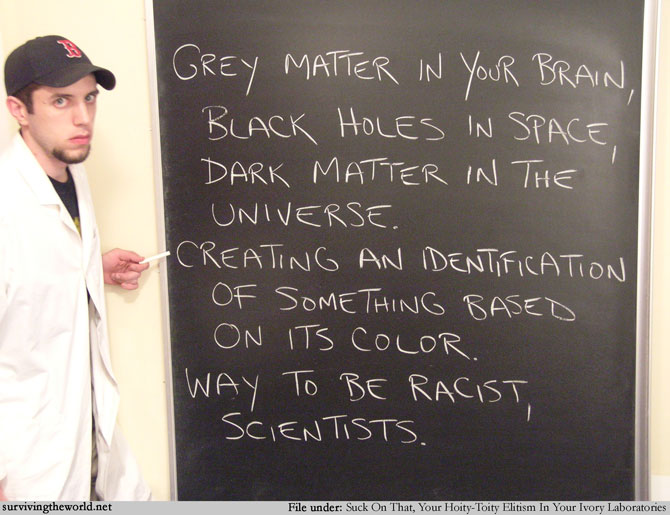Surviving the World
A Photocomic Education by Dante Shepherd
Lesson #1157 - Scientific Bias

Too long didn't read summary of the following diatribe: I don't buy the report on racial NIH funding bias not because of race, but because I don't generally accept many models derived without the basis of theory. You may now continue with the following diatribe if you wish.
I actually made this incredibly facetious comic before the recent report came out that NIH funded projects are far less likely to go to black researchers than to white researchers. Which certainly adds a layer to the comic I wasn't expecting to actually address. When I was a grad student, I was the only white guy for most of my five years in my research group - which got as large as 20 people - but otherwise, my background has not exactly created a way for me have authority on issues like this. But I know I'll get a few emails on the matter, so let me just briefly address it, if I may.
Funding is a pain in the ass - you have to hit the right buzzwords, you might have to completely shift your research background based on the field that is getting funded at the time you're looking for money, and scientific institutions are constantly getting the shaft when it comes to government budget choices. (Check out some of the initial reports on what would happen if the so-called 'super congress' fails this fall. Funding agencies are going to be gasping for air.) Basically, it's hard to get good funding, and you're much more likely to get it if you come with an education from a major university - kind of like how between two candidates for a job, all things equal, the candidate who went to Harvard might be more likely to get the job compare to the candidate who went to Backwater U. When it comes to choosing who gets funded, places like the NIH are not looking at someone's picture when they make decisions on funding. Unless someone is going to go out of their way to Google what someone looks like (which is higly unlikely), the researcher's name and institution are the main material available besides the research proposal itself.
In short, in regards to the report, there are some issues which it is not clear how completely they are accounted for - the network of people that a researcher develops at multiple institutions, which plays a huge role in getting support for anything in science; that the bias goes away when comparing researchers submitting proposals several times (and that the number of black researchers who resubmit a proposal is significantly lower); the number of large universities that NIH prefers to fund and thus the need to account for not only the researcher's background and productivity, but also the background and productivity of the institution as a whole and not just the institution's hiring tendancies. There really might be some bias present beyond those factors, and if there is, it's certainly something that needs to be addressed and solved. But we are talking about science - we don't want to say that something 'couldn't be explained' - we want to actually solve for the source. Let's not just cite something like 'unconscious bias' - something that sounds too much like 'experimental error' as an excuse - and keep investigating so we can solve the actual problem and not just see if it exists.
Basically, if the problem is real, let's figure out why it is occurring, and then go from there to find a solution.
Just like any good science project should do.
- - - - - - - - - - - - - - - - - - - - - - - - - - - - - - - - - - - - - - - - - - - - - - - - - - - - - - - -
I'm going to be at SPX! Will you be there?

